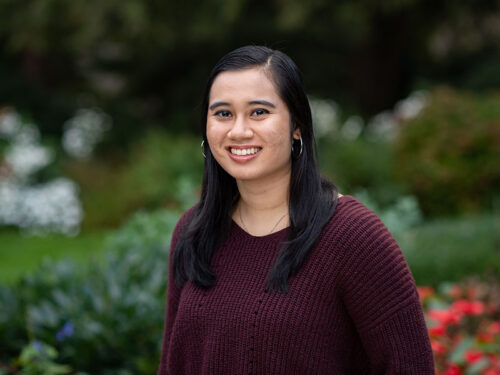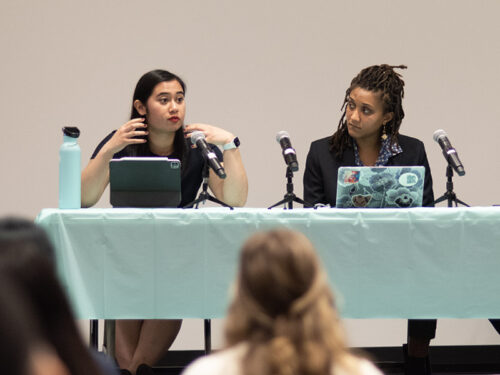Senior Aneesha Manocha receives Kanders Churchill Scholarship for science policy
By Colton Poore

Aneesha Manocha, a senior studying electrical and computer engineering who plans to pursue a Ph.D. to model macro-energy systems, has been selected as one of this year’s two Kanders Churchill Scholars.
As a Kanders Churchill Scholar, Manocha will spend a year studying at the University of Cambridge while living at Churchill College, which comprises students mainly in STEM fields. She will be pursuing a Master’s in Public Policy and said she looks forward to learning how to communicate energy systems research effectively to policymakers, stakeholders, and community members.
“The energy crisis cannot be solved in silos,” Manocha said. “We need communities from different fields working together for this interdisciplinary challenge. We need scientists and engineers who are thinking through the real-world implications of their work and who can bridge the divide between researchers and policymakers.”
The Kanders Churchill Scholarship was created in 2017 to complement the Churchill Scholarship program and address the growing divide between science and science policy. The scholars are selected from a pool of applicants by the Churchill Foundation who first apply and are admitted to the Master’s in Public Policy at the University of Cambridge. The two Kanders Churchill Scholars will join this year’s 16 Churchill Scholars at the University of Cambridge. The Churchill Scholarships, first awarded in 1963, were set up at the request of Sir Winston Churchill as part of his vision for a scientific exchange between the United States and the United Kingdom.
Manocha, originally from Chapel Hill, North Carolina, said she believes the Kanders Churchill Scholarship will allow her to supplement her research experience in energy systems modeling with additional learning on how to identify and communicate the policy implications of her work.
She added that during her time at the University of Cambridge, she also hopes to explore the non-technical implications of energy systems modeling, such as the social, economic, and moral implications of decarbonization strategies.
“I think as engineers generally, we need to prioritize environmental injustices more in our work,” Manocha said. “I want to spend time in the Kanders Churchill Scholarship exploring energy policy and the role of policy in a clean, just energy transition to incorporate those ideas into my future work, both within energy systems modeling and beyond it.”
During her time at Princeton, Manocha has worked closely with Jesse Jenkins, assistant professor of mechanical and aerospace engineering and the Andlinger Center for Energy and the Environment.
As a sophomore, Manocha enrolled in Jenkins’ graduate-level course, “Optimization Methods for Energy Systems Engineering.” He said she had no problem keeping up with the concepts taught in the class and emerged as one of the top students.
In 2021, Manocha was named as a High Meadows Environmental Institute Environmental Scholar and received support to work with Jenkins on modeling the electricity system in India. She has since continued to collaborate with Jenkins on a project to understand how co-locating solar, wind, and energy storage resources can improve the value of energy storage, reduce energy transmission expansion requirements, and increase the market penetration of wind and solar energy. The work has already led to two first-author manuscripts that are being prepared for submission.
Jenkins added he has no doubt that by the time Manocha completes her undergraduate thesis, she is likely to have enough journal-quality papers under her belt to constitute a Ph.D. dissertation.
“Aneesha is one of the top students I have had the pleasure to teach or supervise in my time at Princeton,” Jenkins said. “She works harder than any other undergraduate student I’ve met so far, and she is tirelessly committed to advancing a clean and just energy transition.”

In addition to her major in electrical and computer engineering, Manocha is pursuing certificates in Sustainable Energy, Environmental Studies, Statistics and Machine Learning, and Optimization and Quantitative Decision Science.
Manocha has presented at three conferences and her team received second place in the United States Association for Energy Economics Case Competition. Additionally, she was awarded an honorable mention for the Udall Scholarship for her leadership and public service on environmental issues.
Manocha is president emeritus and former fall conference director of the Princeton University Energy Association (PUEA), where she worked to triple the group’s size and hosted numerous speakers on campus to provide more opportunities to undergraduate students to learn about the field.
In addition to her energy research with Jenkins, she has also had internship experiences with RMI, the Center for Social and Economic Progress (formerly Brookings India), and the Hydrogen and Fuel Cell Technologies Office at the U.S. Department of Energy.
Outside of her work in energy, Manocha said singing in the a cappella group VTone and discovering CrossFit have kept her grounded and have taught her the value of a strong and supportive community.
“One of the things I’ve learned is how much the community I have at Princeton means to me,” Manocha said. “I attribute my successes to my family, to my Princeton community, to Professor Jenkins, and to all the other professors and people who have helped me over the course of my Princeton career.”